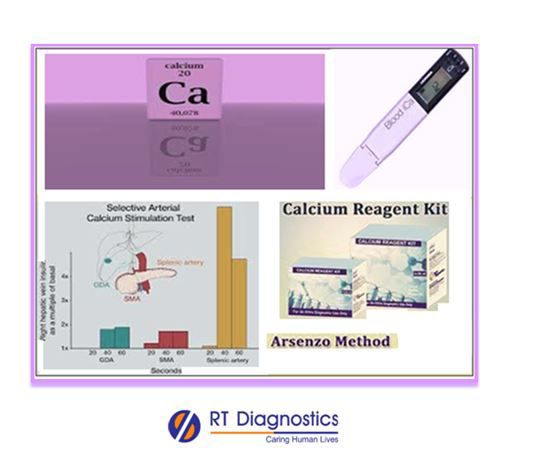Calcium
The calcium test is estimated as Total Calcium and Ionized Calcium. Calcium is an important mineral in the blood involving in blood clotting and also contributes to the strengthening of bones (calcium hydroxyapatite). Calcium is essential for bodily functions. Deficiency of calcium can lead to symptoms such as brain fog, dizziness, lightheadedness, numbness, tingling sensations, insomnia, depression, etc, and negligence in chronic cases can lead to kidney failure and can be life-threatening (fatal). This test evaluates the calcium level of the blood or urine to diagnose calcium disorders (metabolic disorders related to calcium) such as disturbances in nerve impulse conduction, neuromuscular irritability, alterations in the brain (calcification of basal ganglia, and also it can lead to convulsions), muscle contraction issues leading to spasm, alkalemia related tetany, arrhythmias, hormonal release, hormonal disorders (parathyroid), cataract and Bone disorders such as osteoporosis.
CALCIUM:
Why Calcium Test?
CLINICAL INFORMATION
Blood and urine calcium test is ordered to screen for diagnosis and monitor a range of conditions related to the bones, heart, nerves, kidneys, and teeth. It is also ordered in patient with symptoms such as parathyroid disorder, mal-absorption or/and overactive thyroid. Calcium is one of the most important minerals in the body for the normal physiological functioning of nerves, muscles, and the heart. Normal physiological levels of calcium are required for heart function, muscle contraction, nerve signaling, and blood clotting. Normal levels of calcium when gets altered to high or low levels of calcium it can reflect as a sign of bone diseases, thyroid disease, kidney disease, or other medical conditions. In the diagnosis of calcium-related disorders, two tests are performed – ionized calcium and total calcium. Ionized calcium accounts for unattached or free form of unbound calcium in proteins, while total calcium measures the calcium attached to specific proteins. Clinical manifestations of altered calcium levels are reflected by its symptoms. Symptoms of high calcium levels include nausea, vomiting, more frequent urination, increase thirst, constipation, abdominal pain, loss of appetite. Diseases associated with higher calcium levels are hyperparathyroidism, kidney or adrenal failure, sarcoidosis, Paget’s disease of the bone, excessive use of antacids, high intake of calcium from vitamin - D supplements or milk. Low levels of calcium show signs of symptoms such as irregular heartbeat, muscle spasm, muscle cramps, and tingling in lips, tongue, fingers, feet, etc. Diseases associated with lower calcium levels are hypoparathyroidism, vitamin-D deficiency, magnesium deficiency, inflammation of the pancreas (pancreatitis), kidney diseases, osteoporosis, osteopenia, etc, and symptoms of hypocalcemia in neonates include jitteriness, poor feeding, seizures, apnea (slow breathing), tachycardia. Certain diseases such as kidney diseases, thyroid diseases, malnutrition, and medications such as lithium, thiazide diuretics, antacids, atenolol (beta-blocker), colestipol (bile acid sequestrants), estrogen, digoxin, antibiotics – fluoroquinolones, tetracyclines etc and few cancer types with high or low levels of calcium may not reflect any clinical manifestation hence can remain asymptomatic. Other tests for calcium include bone density scan or dexa scan (type of x-ray scan).

General Instructions:
Sample Requirement: Specimen - Blood sample collected from the vein / Urine sample. Test Preparation: None.
NOTE - Sample for specimen collections may vary based on the patient’s condition/cases according to the patient’s presenting complaints/signs or symptoms:
SPECIMEN REQUIREMENT (Special or Rare Cases) - As instructed and guided by Physician / Clinician / Pathologist / as per Laboratory’s requirements, according to procedures and protocols.
Sample Requirement: Blood /Urine Sample
Test Preparation: None
This Multi-Specialty Clinical Referral Laboratory RT DIAGNOSTICS provides precise and accurate tests with an extensive range of testing services to the medical centers to help in the diagnosis and identification of pathology in the test specimens for infectious diseases and also to evaluate the function of organ systems of the patient. It prevents further complications and helps to stabilize and restore health to near normalcy at the earliest without delay.



